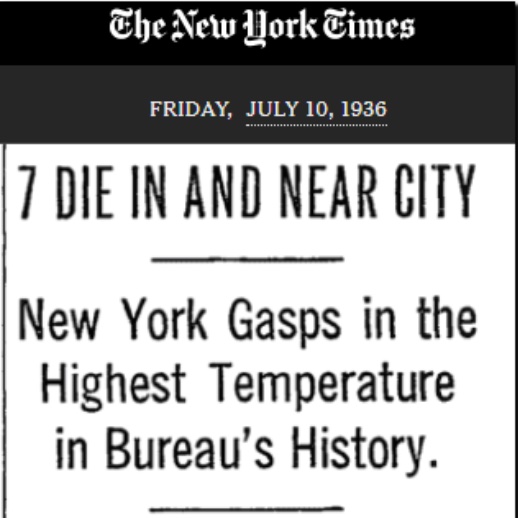The beginning of July was the hottest week on record for the planet as a whole, screamed the World Meteorological Organization. This year had already seen the hottest June on record, the UN body said, driven by climate change and the early stages of an El Niño weather pattern.
“The world just had the hottest week on record, according to preliminary data,” the WMO said in a statement, adding that temperatures were breaking records on land and in the oceans, with “potentially devastating impacts on ecosystems and the environment”.
Blah, blah blah.
For one thing it’s not the hottest.
87 years ago today… deadly heat wave hits New York City.
— Steve Milloy (@JunkScience) July 11, 2023
Times Square at 115°F.
Today’s high in NYC was 30F cooler despite 380% more industrial era CO2.
Emissions don’t cause heat waves. Heat waves are not worsening. Climate = Hoax.https://t.co/D8YYPsSWKD pic.twitter.com/8Dt9XrvZoy
Or was it California?
Twitter is having a debate “Hottest Week On Record”
— Tony Heller (@TonyClimate) July 9, 2023
That occurred in California this week in 1913#ClimateScam pic.twitter.com/9NG3GGeEpL
In reality, the idea that it was the hottest week on record comes from computer modeling and not actual measurements so is not verifiable, hence it’s scaremongering at its most insidious.
Paul Homewood: The idea that global temperatures could shoot up by 0.22C in the space of three days is physically impossible, El Nino or not. And given that it is all based on computer modelling and used as a propaganda tool makes the whole thing worthless.https://t.co/45roD4aeGI
— Climate Realist (@ClimateRealists) July 9, 2023
NOAA is having nothing to do with it.
Data analysed by a group of US scientists shows the global average temperature on Thursday was 17.23C.
It breaks the 17.01C record set on Monday, surpassed just a day later when the average temperature reached 17.18C.
The temperature readings come from a tool called Climate Reanalyzer. Scientists at the University of Maine use a combination of readings from surface, air balloon and satellite observations as well as computer modelling to assess average global temperatures.
The readings are not an official government record, but they are closely watched as an indicator of how temperatures are fluctuating.
On Thursday the US weather service National Oceanic and Atmospheric Administration (NOAA) said it could not confirm records that come partly from computer simulations, according to Associated Press.
This report really does undermine the credibility of the claims. The idea that global temperatures could shoot up by 0.22C in the space of three days is physically impossible, El Nino or not. And given that it is all based on computer modelling and used as a propaganda tool makes the whole thing worthless. (More here at Notalotofpeopleknowthat.com)
